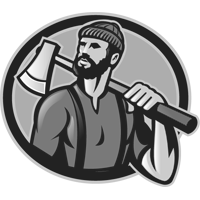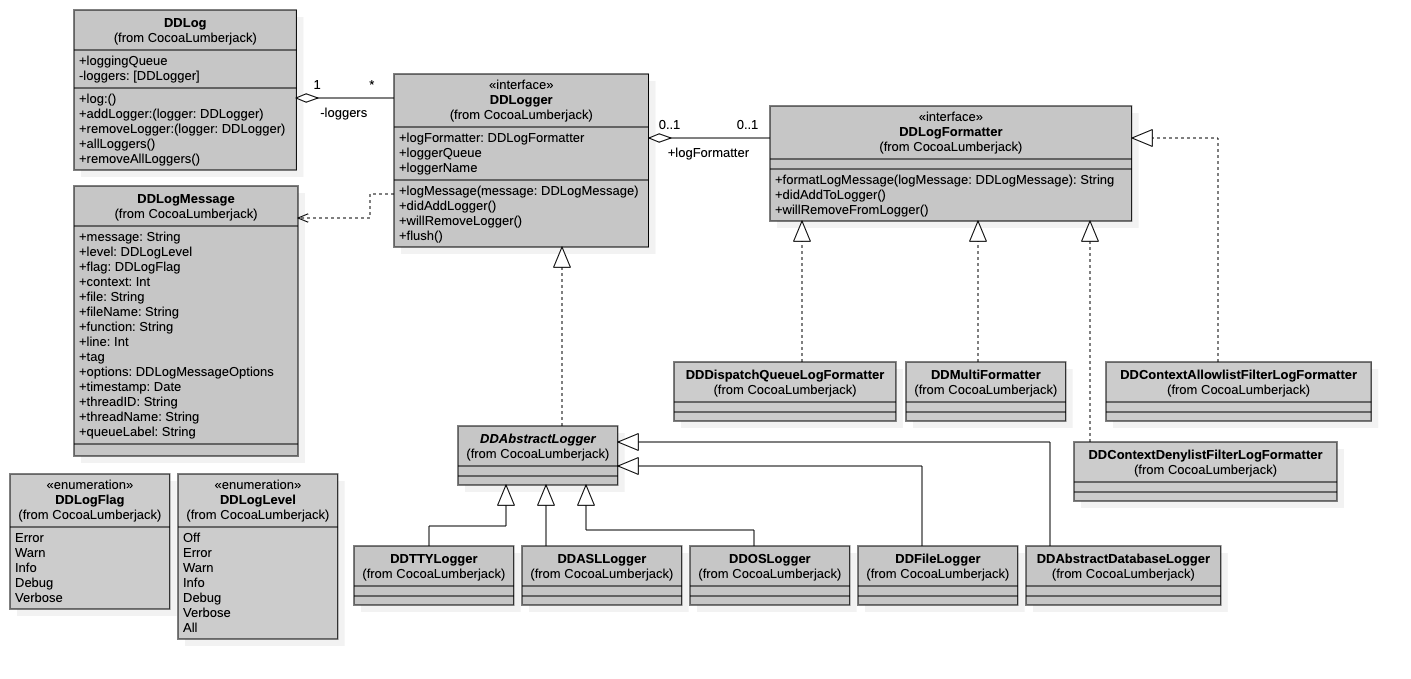CocoaLumberjack is a fast & simple, yet powerful & flexible logging framework for macOS, iOS, tvOS and watchOS.
First, install CocoaLumberjack via CocoaPods, Carthage, Swift Package Manager or manually.
Then use DDOSLogger for iOS 10 and later, or DDTTYLogger and DDASLLogger for earlier versions to begin logging messages.
platform :ios, '9.0'
target 'SampleTarget' do
use_frameworks!
pod 'CocoaLumberjack/Swift'
endNote: Swift is a subspec which will include all the Obj-C code plus the Swift one, so this is sufficient.
For more details about how to use Swift with Lumberjack, see this conversation.
For Objective-C use the following:
platform :ios, '9.0'
target 'SampleTarget' do
pod 'CocoaLumberjack'
endCarthage is a lightweight dependency manager for Swift and Objective-C. It leverages CocoaTouch modules and is less invasive than CocoaPods.
To install with Carthage, follow the instruction on Carthage
Cartfile
github "CocoaLumberjack/CocoaLumberjack"
As of CocoaLumberjack 3.6.0, you can use the Swift Package Manager as integration method. If you want to use the Swift Package Manager as integration method, either use Xcode to add the package dependency or add the following dependency to your Package.swift:
.package(url: "https://github.com/CocoaLumberjack/CocoaLumberjack.git", from: "3.7.0"),Note that you may need to add both products, CocoaLumberjack and CocoaLumberjackSwift to your target since SPM sometimes fails to detect that CocoaLumerjackSwift depends on CocoaLumberjack.
If you want to install CocoaLumberjack manually, read the manual installation guide for more information.
Usually, you can simply import CocoaLumberjackSwift. If you installed CocoaLumberjack using CocoaPods, you need to use import CocoaLumberjack instead.
DDLog.add(DDOSLogger.sharedInstance) // Uses os_log
let fileLogger: DDFileLogger = DDFileLogger() // File Logger
fileLogger.rollingFrequency = 60 * 60 * 24 // 24 hours
fileLogger.logFileManager.maximumNumberOfLogFiles = 7
DDLog.add(fileLogger)
...
DDLogVerbose("Verbose")
DDLogDebug("Debug")
DDLogInfo("Info")
DDLogWarn("Warn")
DDLogError("Error")If you're using Lumberjack as a framework, you can @import CocoaLumberjack;.
Otherwise, #import <CocoaLumberjack/CocoaLumberjack.h>
[DDLog addLogger:[DDOSLogger sharedInstance]]; // Uses os_log
DDFileLogger *fileLogger = [[DDFileLogger alloc] init]; // File Logger
fileLogger.rollingFrequency = 60 * 60 * 24; // 24 hour rolling
fileLogger.logFileManager.maximumNumberOfLogFiles = 7;
[DDLog addLogger:fileLogger];
...
DDLogVerbose(@"Verbose");
DDLogDebug(@"Debug");
DDLogInfo(@"Info");
DDLogWarn(@"Warn");
DDLogError(@"Error");When integrating Lumberjack into an existing Objective-C it is possible to run into Multiple methods named 'tag' found with mismatched result, parameter type or attributes build error.
Add #define DD_LEGACY_MESSAGE_TAG 0 before importing CocoaLumberjack or add #define DD_LEGACY_MESSAGE_TAG 0 or add -DDD_LEGACY_MESSAGE_TAG=0 to Other C Flags/OTHER_CFLAGS in your Xcode project.
swift-log backend
CocoaLumberjack also ships with a backend implementation for swift-log.
Simply add CocoaLumberjack as dependency to your SPM target (see above) and also add the CocoaLumberjackSwiftLogBackend product as dependency to your target.
You can then use DDLogHandler as backend for swift-log, which will forward all messages to CocoaLumberjack's DDLog. You will still configure the loggers and log formatters you want via DDLog, but writing log messages will be done using Logger from swift-log.
In your own log formatters, you can make use of the swiftLogInfo property on DDLogMessage to retrieve the details of a message that is logged via swift-log.
To use swift-log with CocoaLumberjack, take a look the following code snippet to see how to get started.
// Import necessary packages
import CocoaLumberjackSwift
import CocoaLumberjackSwiftLogBackend
import Logging
// In your application's entry point (e.g. AppDelegate):
DDLog.add(DDOSLogger.sharedInstance) // Configure loggers
LoggingSystem.bootstrapWithCocoaLumberjack() // Use CocoaLumberjack as swift-log backend- read the Getting started guide, check out the FAQ section or the other docs
- if you find issues or want to suggest improvements, create an issue or a pull request
- for all kinds of questions involving CocoaLumberjack, use the Google group or StackOverflow (use #lumberjack).
- To be determined
It is similar in concept to other popular logging frameworks such as log4j, yet is designed specifically for Objective-C, and takes advantage of features such as multi-threading, grand central dispatch (if available), lockless atomic operations, and the dynamic nature of the Objective-C runtime.
In most cases it is an order of magnitude faster than NSLog.
It takes as little as a single line of code to configure lumberjack when your application launches. Then simply replace your NSLog statements with DDLog statements and that's about it. (And the DDLog macros have the exact same format and syntax as NSLog, so it's super easy.)
One log statement can be sent to multiple loggers, meaning you can log to a file and the console simultaneously. Want more? Create your own loggers (it's easy) and send your log statements over the network. Or to a database or distributed file system. The sky is the limit.
Configure your logging however you want. Change log levels per file (perfect for debugging). Change log levels per logger (verbose console, but concise log file). Change log levels per xcode configuration (verbose debug, but concise release). Have your log statements compiled out of the release build. Customize the number of log levels for your application. Add your own fine-grained logging. Dynamically change log levels during runtime. Choose how & when you want your log files to be rolled. Upload your log files to a central server. Compress archived log files to save disk space...
- You're looking for a way to track down that impossible-to-reproduce bug that keeps popping up in the field.
- You're frustrated with the super short console log on the iPhone.
- You're looking to take your application to the next level in terms of support and stability.
- You're looking for an enterprise level logging solution for your application (Mac or iPhone).
- Get started using Lumberjack
- Different log levels for Debug and Release builds
- Different log levels for each logger
- Use colors in the Xcode debugging console
- Write your own custom formatters
- FAQ
- Analysis of performance with benchmarks
- Common issues you may encounter and their solutions
- AppCode support
- Full Lumberjack documentation
The current version of Lumberjack requires:
- Xcode 12 or later
- Swift 5.3 or later
- iOS 9 or later
- macOS 10.10 or later
- watchOS 3 or later
- tvOS 9 or later
- for Xcode 11 and Swift up to 5.2, use the 3.6.2 version
- for Xcode 10 and Swift 4.2, use the 3.5.2 version
- for iOS 8, use the 3.6.1 version
- for iOS 6, iOS 7, OS X 10.8, OS X 10.9 and Xcode 9, use the 3.4.2 version
- for iOS 5 and OS X 10.7, use the 3.3 version
- for Xcode 8 and Swift 3, use the 3.2 version
- for Xcode 7.3 and Swift 2.3, use the 2.4.0 version
- for Xcode 7.3 and Swift 2.2, use the 2.3.0 version
- for Xcode 7.2 and 7.1, use the 2.2.0 version
- for Xcode 7.0 or earlier, use the 2.1.0 version
- for Xcode 6 or earlier, use the 2.0.x version
- for OS X < 10.7 support, use the 1.6.0 version
- If you need help, use Stack Overflow. (Tag 'lumberjack')
- If you'd like to ask a general question, use Stack Overflow.
- If you found a bug, open an issue.
- If you have a feature request, open an issue.
- If you want to contribute, submit a pull request.
Per App privacy details on the App Store, Apple is requesting app developers to provide info about their data collection, us SDK maintainers must provide them with the same data.
By default, CocoaLumberjack does NOT collect any data on its own.
See our Data Collection Practices list.
CocoaLumberjack is a logging framework which makes it easy to send those logs to different platforms.
This is why collecting data might happen quite easily, if app developers include any sensitive data into their log messages.
Important note: app developers are fully responsible for any sensitive data collected through our logging system!
In consequence, you must comply to the Apple's privacy details policy (mentioned above) and document the ways in which user data is being collected. Since the number of scenarios where data might be indirectly collected through CocoaLumberjack is quite large, it's up to you, as app developers, to properly review your app's code and identify those cases. What we can do to help is raise awareness about potential data collection through our framework.
Private data includes but isn't limited to:
- user info (name, email, address, ...)
- location info
- contacts
- identifiers (user id, device id, ...)
- app usage data
- performance data
- health and fitness info
- financial info
- sensitive info
- user content
- history (browsing, search, ...)
- purchases
- diagnostics
- ...
Example: DDLogInfo("User: \(myUser)") will add the myUser info to the logs, so if those are forwarded to a 3rd party or sent via email, that may qualify as data collection.
- Robbie Hanson
- Love the project? Wanna buy me a coffee? (or a beer :D)
- Ernesto Rivera
- Dmitry Vorobyov
- Bogdan Poplauschi
- C.W. Betts
- Koichi Yokota (sushichop)
- Nick Brook
- Florian Friedrich
- Stephan Diederich
- Kent Sutherland
- Dmitry Lobanov
- Hakon Hanesand
- CocoaLumberjack is available under the BSD 3 license. See the LICENSE file.
- LogIO-CocoaLumberjack A log.io logger for CocoaLumberjack
- XCDLumberjackNSLogger CocoaLumberjack logger which sends logs to NSLogger






